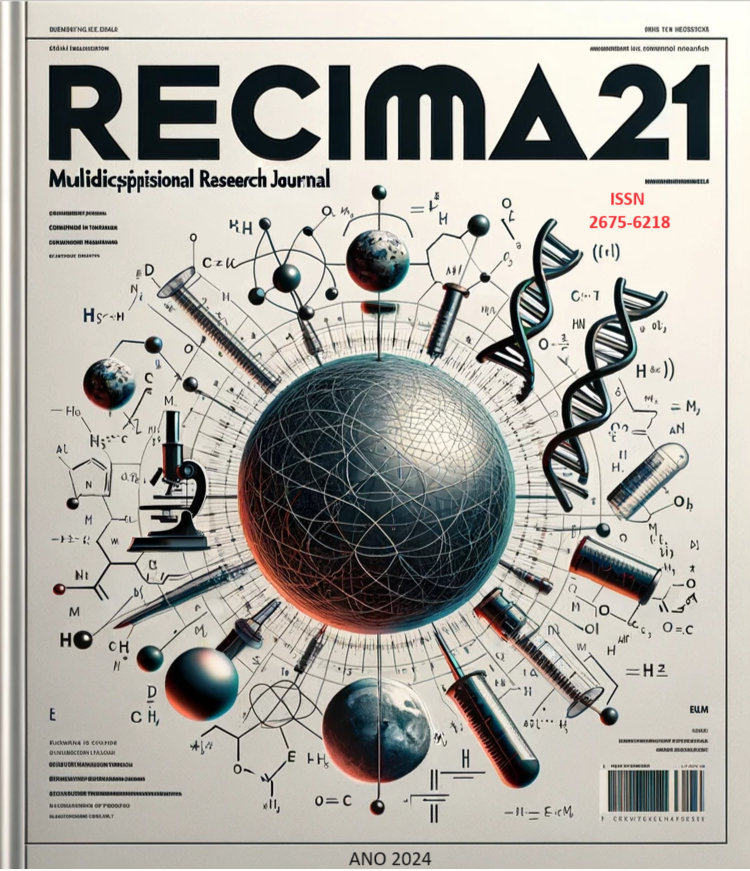USE OF ENDOBRONCHIAL VALVE IN PATIENTS WITH THE EMPHYSEMATOUS PHENOTYPE OF COPD
DOI:
https://doi.org/10.47820/recima21.v5i10.5671Keywords:
Endobronchial valve, COPD, Pulmonary valve, emphysema.Abstract
Chronic obstructive disease (COPD) causes functional restriction and reduced quality of life due to symptoms such as dyspnea, fatigue, productive cough, and exacerbations, resulting in frequent hospitalizations. In the most severe cases, the feeling of shortness of breath is intensified, aggravating the imbalance between the imposed load and the respiratory muscle capacity. A conservative approach to treating this condition is the application of endobronchial valves. These one-way valves, inserted by bronchoscopy into the airways of the emphysema-affected lung, promote pulmonary deflation by reducing hyperinflation, allowing the elimination of air and secretions while preventing excessive air intake. Method: An integrative review of randomized controlled trials whose main outcome was to analyze the efficacy of endobronchial valves in the symptomatology and prognosis associated with the emphysematous phenotype of COPD. Results: Studies suggest that the use of the endobronchial valve (EBV) reduces pulmonary hyperinflation and dyspnea, in addition to providing a significant improvement in FEV1 and reducing static hyperinflation. These benefits result in an improvement in dyspnea, quality of life, and exercise capacity. Conclusion: The use of the endobronchial valve (EBV) has been shown to be effective in reducing the symptoms of COPD. Regarding safety, the treatment presented an acceptable profile, despite adverse events reported in most studies; It is important to highlight that no deaths were associated with the procedure.
Downloads
References
Criner GJ, Mallea JM, Abu-Hijleh M, Sachdeva A, Kalhan R, Hergott CA, Lazarus DR, Mularski RA, Calero K, Reed MF, Nsiah-Dosu S, Himes D, Kubo H, Kinsey CM, Majid A, Hogarth DK, Kaplan PV, Case AH, Makani SS, Chen TM, Delage A, Zgoda M, Shepherd RW. Sustained Clinical Benefits of Spiration Valve System in Patients with Severe Emphysema: 24-Month Follow-Up of EMPROVE. Ann Am Thorac Soc. 2024 Feb;21(2):251-260. doi: 10.1513/AnnalsATS.202306-520OC. DOI: https://doi.org/10.1513/AnnalsATS.202306-520OC
Criner GJ, Sue R, Wright S, Dransfield M, Rivas-Perez H, Wiese T, Sciurba FC, Shah PL, Wahidi MM, de Oliveira HG, Morrissey B, Cardoso PFG, Hays S, Majid A, Pastis N Jr, Kopas L, Vollenweider M, McFadden PM, Machuzak M, Hsia DW, Sung A, Jarad N, Kornaszewska M, Hazelrigg S, Krishna G, Armstrong B, Shargill NS, Slebos DJ; LIBERATE Study Group. A Multicenter Randomized Controlled Trial of Zephyr Endobronchial Valve Treatment in Heterogeneous Emphysema (LIBERATE). Am J Respir Crit Care Med. 2018 Nov 1;198(9):1151-1164. doi: 10.1164/rccm.201803-0590OC. DOI: https://doi.org/10.1164/rccm.201803-0590OC
Dransfield MT, Garner JL, Bhatt SP, Slebos DJ, Klooster K, Sciurba FC, Shah PL, Marchetti NT, Sue RD, Wright S, Rivas-Perez H, Wiese TA, Wahidi MM, Goulart de Oliveira H, Armstrong B, Radhakrishnan S, Shargill NS, Criner GJ; LIBERATE Study Group:. Effect of Zephyr Endobronchial Valves on Dyspnea, Activity Levels, and Quality of Life at One Year. Results from a Randomized Clinical Trial. Ann Am Thorac Soc. 2020 Jul;17(7):829-838. doi: 10.1513/AnnalsATS.201909-666OC. DOI: https://doi.org/10.1513/AnnalsATS.201909-666OC
Eberhardt R, Gerovasili V, Kontogianni K, Gompelmann D, Ehlken N, Herth FJ, Grünig E, Nagel C. Endoscopic lung volume reduction with endobronchial valves in patients with severe emphysema and established pulmonary hypertension. Respiration. 2015;89(1):41-8. doi: 10.1159/000368369. Epub 2014 Dec 4. DOI: https://doi.org/10.1159/000368369
Hartman JE, Klooster K, Slebos DJ, Ten Hacken NH. Improvement of physical activity after endobronchial valve treatment in emphysema patients. Respir Med. 2016 Aug;117:116-21. doi: 10.1016/j.rmed.2016.06.009. DOI: https://doi.org/10.1016/j.rmed.2016.06.009
He W, Wang J, Feng Z, Li J, Xie Y. Effects of exercise-based pulmonary rehabilitation on severe/very severe COPD: a systematic review and meta-analysis. Ther Adv Respir Dis. 2023 Jan-Dec; 17:17534666231162250. doi: 10.1177/17534666231162250. DOI: https://doi.org/10.1177/17534666231162250
Kemp SV, Slebos DJ, Kirk A, Kornaszewska M, Carron K, Ek L, Broman G, Hillerdal G, Mal H, Pison C, Briault A, Downer N, Darwiche K, Rao J, Hübner RH, Ruwwe-Glosenkamp C, Trosini-Desert V, Eberhardt R, Herth FJ, Derom E, Malfait T, Shah PL, Garner JL, Ten Hacken NH, Fallouh H, Leroy S, Marquette CH; TRANSFORM Study Team *. A Multicenter Randomized Controlled Trial of Zephyr Endobronchial Valve Treatment in Heterogeneous Emphysema (TRANSFORM). Am J Respir Crit Care Med. 2017 Dec 15;196(12):1535-1543. doi: 10.1164/rccm.201707-1327OC. DOI: https://doi.org/10.1164/rccm.201707-1327OC
Li S, Wang G, Wang C, Gao X, Jin F, Yang H, Han B, Zhou R, Chen C, Chen L, Bai C, Shen H, Herth FJF, Zhong N. The REACH Trial: A Randomized Controlled Trial Assessing the Safety and Effectiveness of the Spiration® Valve System in the Treatment of Severe Emphysema. Respiration. 2019;97(5):416-427. doi: 10.1159/000494327. DOI: https://doi.org/10.1159/000494327
Santus P, Radovanovic D, Saad M, Zilianti C, Coppola S, Chiumello DA, Pecchiari M. Acute dyspnea in the emergency department: a clinical review. Intern Emerg Med. 2023 Aug;18(5):1491-1507. doi:10.1007/s11739-023-03322-8. DOI: https://doi.org/10.1007/s11739-023-03322-8
Sciurba FC, Ernst A, Herth FJ, Strange C, Criner GJ, Marquette CH, Kovitz KL, Chiacchierini RP, Goldin J, McLennan G; VENT Study Research Group. A randomized study of endobronchial valves for advanced emphysema. N Engl J Med. 2010 Sep 23;363(13):1233-44. doi: 10.1056/NEJMoa0900928. DOI: https://doi.org/10.1056/NEJMoa0900928
Valipour A, Herth FJ, Burghuber OC, Criner G, Vergnon JM, Goldin J, Sciurba F, Ernst A; VENT Study Group. Target lobe volume reduction and COPD outcome measures after endobronchial valve therapy. Eur Respir J. 2014 Feb;43(2):387-96. doi: 1 DOI: https://doi.org/10.1183/09031936.00133012
Downloads
Published
License
Copyright (c) 2024 RECIMA21 - Revista Científica Multidisciplinar - ISSN 2675-6218

This work is licensed under a Creative Commons Attribution 4.0 International License.
Os direitos autorais dos artigos/resenhas/TCCs publicados pertecem à revista RECIMA21, e seguem o padrão Creative Commons (CC BY 4.0), permitindo a cópia ou reprodução, desde que cite a fonte e respeite os direitos dos autores e contenham menção aos mesmos nos créditos. Toda e qualquer obra publicada na revista, seu conteúdo é de responsabilidade dos autores, cabendo a RECIMA21 apenas ser o veículo de divulgação, seguindo os padrões nacionais e internacionais de publicação.













